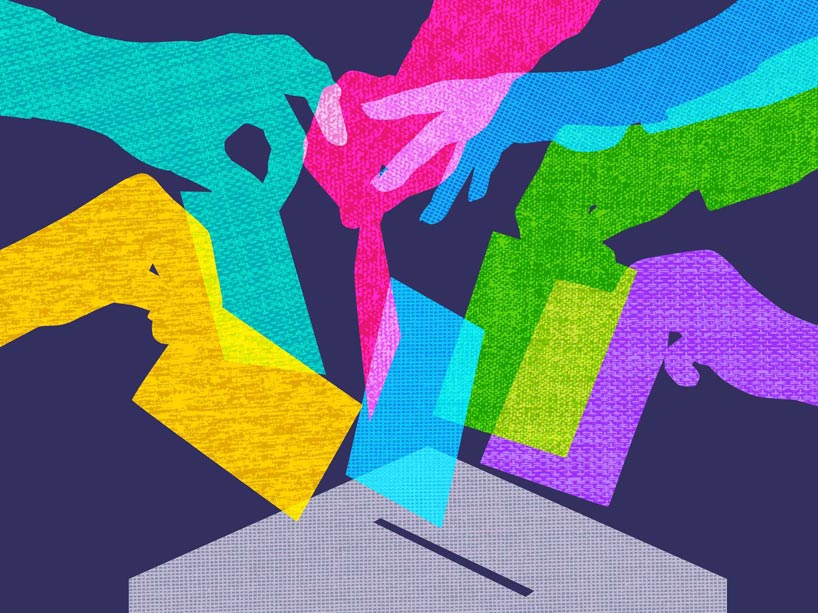#Vote2019: Putting democracy under the microscope

Ryerson researchers are taking a deep dive into issues that are both pulling people apart and bringing them together as the federal election draws closer.
Fake news. Misinformation. Increasing populism and polarization. These are some of the monumental challenges that voters are up against as they head to the polls to vote in Canada’s 43rd federal election in just a few short weeks.
And Ryerson researchers are at the forefront in analysing the impact of these forces on democracy, from the polarizing effects of social media during the election campaign, to electoral behaviour and political engagement.
There are several projects underway that are shining a spotlight on the impact of digital media on the federal election. Funded by the federal government’s Digital Ecosystem Research Challenge (external link) (DERC), one of these projects is led by Karim Bardeesy and Sam Andrey from the Ryerson Leadership Lab (external link) . They are partnering with Who Targets Me and Vox Pop Labs to provide an in-depth analysis and public engagement on political advertising on Facebook and evaluate the effectiveness of Canada’s new political advertising regulations.
Professor Greg Elmer, director of the Infoscape Lab at The Catalyst at FCAD, is investigating the dark web’s impact on the upcoming federal election. His research, also being funded by DERC, will examine how political memes, language and shared information (videos, photos, graphics, posts etc.) from fringe websites can become entrenched in mainstream political discourse through established social media platforms and news sites.
A third DERC-funded project is being led by Professor Anatoliy Gruzd, the Canada Research Chair in Social Media Data Stewardship, Philip Mai and Raquel Recuero from Ted Rogers School of Management’s Social Media Lab (external link) . The researchers are taking a deep dive into online violence, particularly against women and ethnic minorities running for public office, and its effects on political engagement on Twitter.
These three research projects were among the 18 winning proposals that were awarded between $3,000 to $75,000 to research teams in Canada and abroad. The DERC is a collaborative effort between Elizabeth Dubois from the University of Ottawa and Taylor Owen from McGill University.
Along with the impact of digital media on the fall election, other researchers at Ryerson have been putting electoral democracy under the microscope. One such professor is Daniel Rubenson. The researcher, whose expertise lies in voter behaviour and political communication among other areas, is one of four co-investigators on the 2019 Canadian Election Study (external link) . The study, running since 1965, surveys Canadian citizens each election year on their political behaviour and attitudes on key issues such as free trade with the U.S. and support for immigration as well as their views on political actors, such as parties, party leaders and government.
Rubenson is part of the executive team of the Consortium on Electoral Democracy | Consortium de la démocratié électorale (C-Dem (external link) ), which is administering the Canadian Election study. Over the next seven years, C-Dem will survey Canadians on key questions such as: how satisfied are you with how democracy works in Canada? Do you plan to vote in the next election? What are your main primary sources of political and voting information? Other members of the C-Dem research team from Ryerson include John Beebe of the Democratic Engagement Exchange and professor Michael McGregor, Department of Politics and Public Administration, and principal investigator of the Canadian Municipal Election Study (external link) .
Women who are running for public office this federal election have also faced sexual harassment, both online and in-person. Thanks to an Insight Grant from the Social Sciences and Humanities Research Council, professor Tracey Raney, whose expertise lies in women in politics, is studying the efforts at different levels of government – provincial, federal and territorial – to combat sexism and sexual harassment. Preventing sexism and violence against women in politics will help boost women’s representation in the Canadian political process, which is a goal of her research.
In addition to research, the university has hosted expert political panels from leading strategists, campaign leaders and members of the press in recent years to help bring issues to the fore during elections. The Faculty of Arts recently held the Ryerson Democracy Forum, featuring a panel of veteran political journalists that was co-moderated by Jarislowsky Democracy Chair Sanjay Ruparelia and Martin Regg Cohn, a provincial politics columnist for the Toronto Star, and a visiting practitioner at Ryerson University.
Faculty members have also been providing insightful expert commentary to the press on the election coverage thus far, from what’s happening in local ridings to the online attacks female parliamentarians have faced around climate change.
As the Ryerson community heads to the polls on Oct. 21, they will see the end of one of the most polarizing election campaigns fraught with populist rhetoric, but one that will give researchers greater insight on how Canadians are engaging – or disengaging – with the current state of politics.